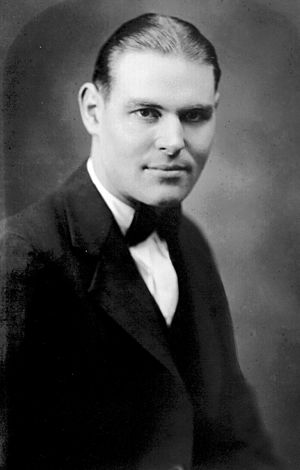William Pfaff facts for kids
Quick facts for kids
William Pfaff
|
|
|---|---|
 |
|
| Born | December 29, 1928 |
| Died | April 30, 2015 (aged 86) Paris, France
|
| Alma mater | University of Notre Dame |
| Occupation | Writer, political commentator |
William Pfaff (born December 29, 1928 – died April 30, 2015) was an American writer. He was known for writing articles that shared his opinions. He wrote for the International Herald Tribune newspaper and often contributed to The New York Review of Books magazine.
Contents
Early Life and Education
William Pfaff was born in Council Bluffs, Iowa. His family had German, English, and Irish roots. He spent his childhood in Iowa and Georgia. In 1949, he finished his studies at the University of Notre Dame. There, he focused on literature and politics.
Starting His Career
After college, Pfaff got a job at Commonweal magazine in 1949. This was a Catholic magazine. He got the job thanks to a letter from his English professor at Notre Dame.
Military Service
Pfaff joined the United States Army. He served in the infantry and Special Forces during and after the Korean War. He was on a ship when the war officially ended. This meant he never had to fight in battles. He left the army with honor, holding the rank of staff sergeant.
Working as a Journalist
After his military service, Pfaff returned to Commonweal magazine. He worked as an assistant editor. In 1955, he traveled a lot in Europe, Africa, and the Middle East. He then worked briefly at ABC News in New York. Later, he joined the Free Europe Committee. In 1961, he started working at the Hudson Institute. This was a think tank, a group that studies and gives advice on public policy.
Becoming an Anti-War Writer
William Pfaff became known for his views against war. He wrote many books and articles about international politics.
First Books and Ideas
His first book, The New Politics: America and the End of the Postwar World, came out in 1961. He wrote it with Edmund Stillman. Seven more books followed this one.
A famous writer named Robert Heilbroner said in 1964 that Pfaff's ideas were very important. He felt that serious thinkers would need to consider Pfaff's strong messages.
During the 1960s, Pfaff wrote three books with Ed Stillman:
- The New Politics: America and the End of the Postwar World (1961)
- The Politics of Hysteria: The Sources of Twentieth-Century Conflict (1964)
- Power and Impotence: The Failure of America's Foreign Policy (1966)
In 1971, Pfaff wrote another book by himself, called Condemned to Freedom.
Moving to Paris
At the Hudson Institute, Pfaff often shared different ideas from Herman Kahn. Kahn had more aggressive views on war. Pfaff disagreed with the debates about the Vietnam War. So, in 1971, he moved to Paris, France. There, he became a leader at Hudson Institute Europe.
In 1978, he left the Hudson Institute Europe. He wanted to work as a freelance writer and journalist. This meant he would work for himself. His most important writing job was with The New Yorker magazine. From 1971 to 1992, he wrote over 70 articles for them. These articles were about international politics and society.
Pfaff also had a long-term job writing a column twice a week for the International Herald Tribune. He continued writing this column until he passed away.
Important Works and Recognition
In 1989, Pfaff published a book called The Barbarian Sentiments. It was a collection of his articles from The New Yorker. The political events of 1989, like the fall of the Berlin Wall, seemed to prove his ideas about foreign policy were right. He was even a finalist for the 1989 National Book Award. After this, he became a popular speaker around the world.
In 1993, he published The Wrath of Nations: Civilization and the Furies of Nationalism. This book studied the idea of nationalism, which is a strong feeling of pride and loyalty to one's own country.
Before the Iraq War in 2003, Pfaff wrote many articles questioning the war. Many of these articles were put together in a book called Fear, Anger and Failure (2004). Around the same time, Pfaff wrote The Bullet's Song. This book explored why revolutionary violence was appealing in the 20th century.
In 2010, Pfaff published his last book, The Irony of Manifest Destiny.
His articles also appeared in many other magazines. These included The New York Review of Books, Harper's, and Foreign Affairs.
The American historian Arthur Schlesinger, Jr. called him the true successor to Walter Lippmann, another famous journalist. William Pfaff died in 2015 from a heart attack after a fall. He is buried in Paris, France.
Books by William Pfaff
- The New Politics: America and the End of the Postwar World with Ed Stillman (1961)
- The Politics of Hysteria: The Sources of Twentieth-Century Conflict with Ed Stillman (1964)
- Power and Impotence: The Failure of America's Foreign Policy with Ed Stillman (1966)
- Condemned to Freedom (1971)
- Barbarian Sentiments: America in the New Century (2000) (a new version of his 1989 book)
- The Wrath of Nations: Civilization and the Furies of Nationalism (1993)
- The Bullet's Song: Romantic Violence and Utopia (2004)
- Fear, Anger and Failure: A Chronicle of the Bush Administration's War against Terror from the Attacks of September 11, 2001 to Defeat in Baghdad (2004)
- The Irony Of Manifest Destiny: The Tragedy of American Foreign Policy (2010)
 | Tommie Smith |
 | Simone Manuel |
 | Shani Davis |
 | Simone Biles |
 | Alice Coachman |

